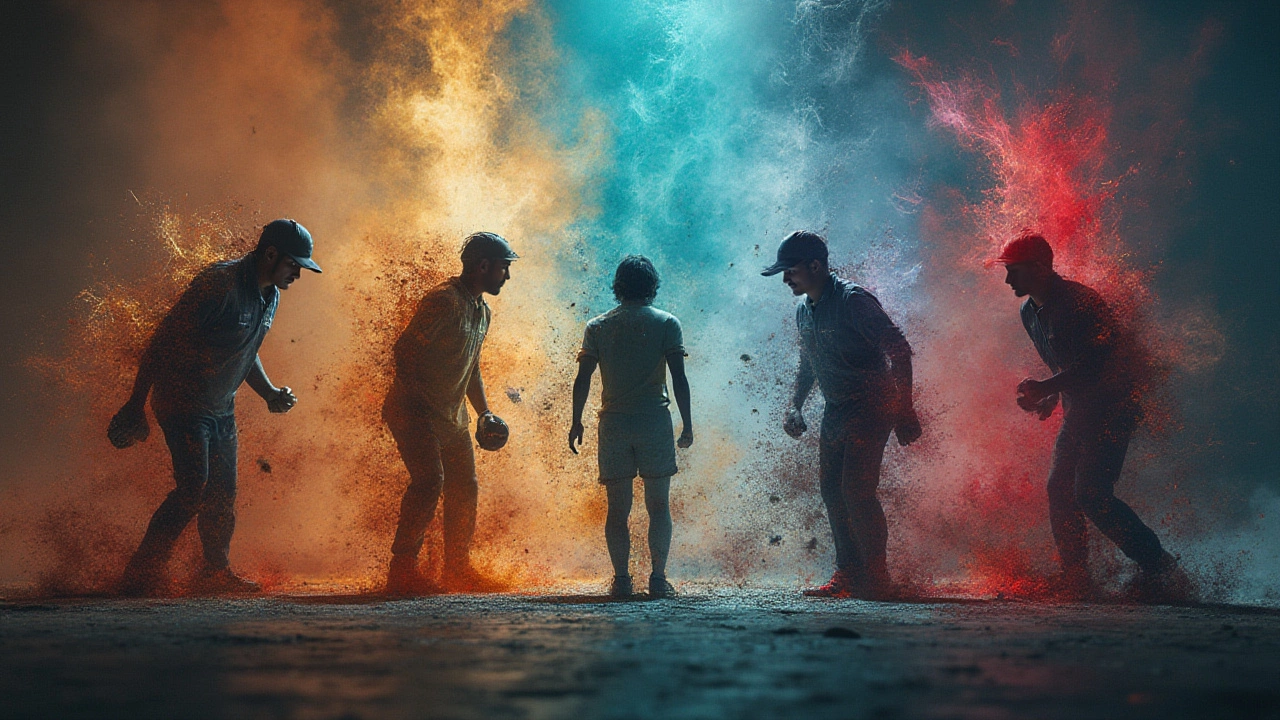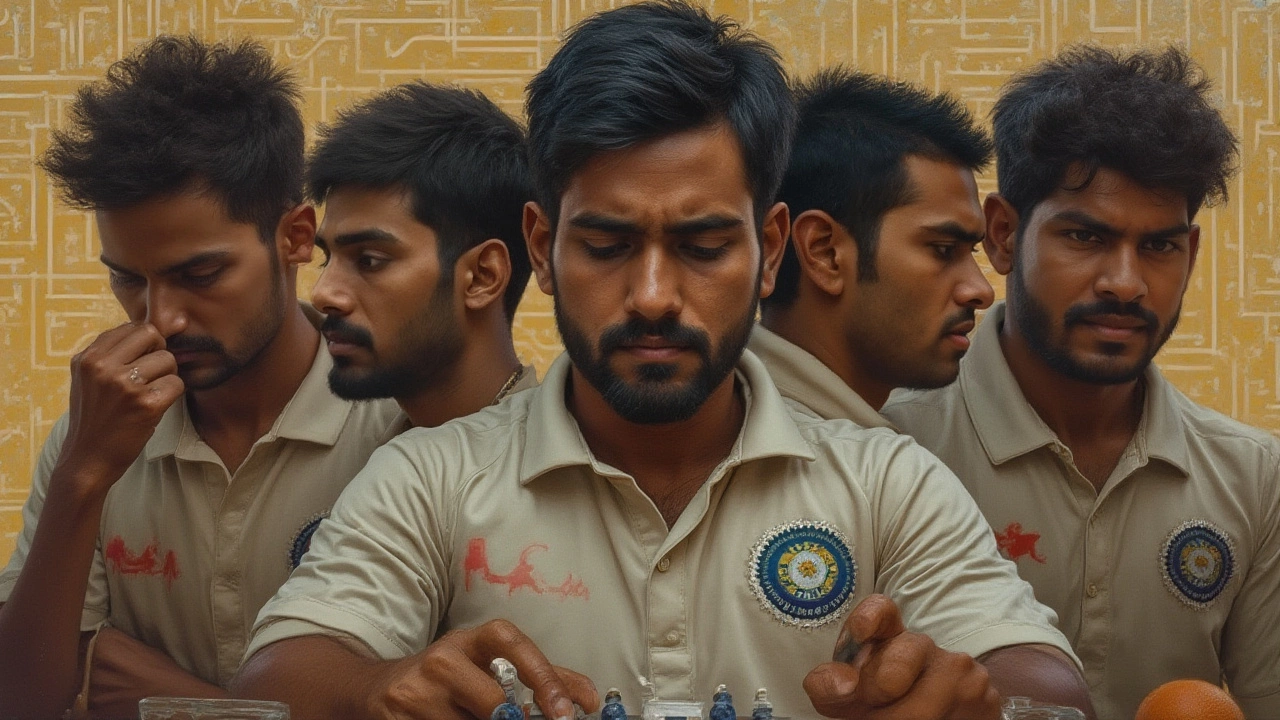Mentally Toughest Sports: What Truly Challenges the Mind?
 Jul, 6 2025
Jul, 6 2025
Think the hardest part about sports is the physical grind? Not even close. Ask any elite athlete, and you’ll hear the same thing: it’s the head games that break you. Raw strength and speed are obvious, sure, but real victory often starts and ends above the neck. The question eats at fans, barbershop debaters, and even scientists—what is the hardest sport mentally? There’s no quick answer. Dive into NFL locker rooms, tennis courts in sweltering heat, empty-morning pools, and even a quiet chessboard, and you’ll discover mind-bending pressures most folks never witness. Some sports demand nerves of steel for seconds; others require you to stay razor-sharp for hours, if not days. Let’s unravel why mental muscle matters just as much—sometimes more—than physical grit, and which game strains it to the absolute limit.
The Hidden Battles: Why Mental Strength Trumps Physical Ability
We all see sprinters gasping after a 200-meter dash and footballers dragging their bodies off the field battered and bruised. But the real grind often unfolds in the shadows of their minds. There’s a Princeton research study floating around from 2022 that found out, for elite athletes, decisions and mental fatigue alter performance almost more than muscle fatigue. Why? Because humans aren’t built for endless focus under blinding lights—especially with millions watching and careers on the line. Countless sporting disasters have started in a split second of hesitation or panic: a botched penalty kick, a missed putt, a wild pitch in the ninth inning. The most decorated champions—think Michael Jordan, Serena Williams, Tom Brady—talk almost obsessively about meditation, visualization, and their intense psychological routines. Their coaches hire sleep therapists, sports psychologists, and mindset gurus as often as they do nutritionists or trainers. The mental game isn’t just about staying positive; it’s about managing doubt, shutting off bad thoughts, rebooting from failure, and keeping emotion in check when adrenaline is surging.
Let’s put it in numbers. Mental errors, not physical, account for more than 60% of outcomes in high-stress matches in sports like tennis and baseball (according to sports psychology studies from the University of Bath, 2021). In extremely technical competitions like Olympic gymnastics or diving, pressure is so intense that even a 0.01-second break in focus leads to disaster. One distracting thought—a bad judge’s call or a double-fault—snowballs into catastrophe. That’s why many retired pros confess to off-field struggles, often wrestling anxiety, depression, or insomnia from the sheer mental drain. It’s not just about who can run or jump higher. True greatness comes from those who outthink—not just outmuscle—their rivals.
Contenders for the Crown: Which Sports Slam Athletes Mentally?
The barstool debate rages on, but ask around and a shortlist of sports always comes up—gymnastics, tennis, boxing, golf, and marathon swimming to name a few. Each brings a unique twist to the mind games.
Tennis looks gentle until you step into a five-set Grand Slam match where one error can unravel hours of work. Roger Federer once admitted the only way to survive is “to be your own psychologist, every second, every shot.” In fact, a 2021 survey by the International Tennis Federation showed 67% of active players battle intense on-court anxiety—particularly in tiebreaks. Not to mention tennis stars regularly face directly their rival, alone, in total silence between serves—a psychological stare-down unmatched in many sports.
Now, check out gymnastics. What’s harder: spinning through the air on a four-inch beam, or calming your mind knowing one twitch could cost gold? When Simone Biles dropped out of several Olympic events in Tokyo, she didn’t hide her reasons: “My head wasn’t in it. I had the twisties.” Mental blocks in gymnastics are not just annoying—they’re dangerous. Nearly 78% of top gymnasts report mental blocks at least once in their career, and nearly half say they’ve experienced the ‘twisties’ (a state where they lose air awareness).
Football and basketball pack mental challenges of a different breed. You’re managing team dynamics, playbooks as thick as phone books, unpredictable opponents, and split-second decisions—sometimes in the blinding pressure-cooker of the playoffs. Interceptions, game-winners at the buzzer, heartbreak and glory, all come down to mental resilience. Tom Brady famously credits more than half his career to mental ‘reps’ instead of physical ones.
Combat sports like boxing and MMA push mental toughness farther. It’s you, your opponent, and no escape. Enduring pain, surviving knockdowns, and fighting on after a brutal round require more than just physical conditioning—you need a psychological iron wall. Post-fight interviews with UFC fighters often sound more like therapy sessions than sports talk. Fighters train not just to punch harder, but to block out fear and hold strong when every instinct screams to quit.
Then there’s golf. Laugh if you want. It’s not just a stroll through manicured grass. The average professional tournament lasts four rounds over four days. You make one bad swing and have to walk in silence—sometimes for an hour—alone with your thoughts, chewing over what just happened. Studies published by the American Journal of Sports Medicine in 2023 found that yips (a form of performance anxiety) affect more than 48% of tour pros at some point—sometimes ending entire careers. When you see a golfer’s hands shaking, it’s not from a long walk.
Endurance sports crank up isolation and mental torture even more. Solo marathon swimmers spend 12 hours with just their thoughts and cold water. Ultramarathon runners hallucinate from exhaustion, yet keep putting one foot in front of the other, motivated by a willpower most people can’t imagine. In 2023, Jasmin Paris became the first woman to finish the Barkley Marathons, an event known for breaking runners down mentally long before their muscles fail.
Don’t underestimate ‘mind sports’ either. Take chess. Sure, you’re sitting still, but after twelve hours of mental warfare, Grandmasters burn nearly 6,000 calories—more than an NFL player does in some games. A single blunder in the late game costs months of preparation. Legendary champion Garry Kasparov admitted he lost up to 10 lbs during world title events, all from brainwork and nerves.
| Sport | Common Mental Challenge | % Athletes Reporting Severe Stress |
|---|---|---|
| Tennis | Pressure points, isolation | 67% |
| Gymnastics | Mental blocks, fear of injury | 78% |
| Boxing | Pain tolerance, fear management | 51% |
| Golf | Performance anxiety (yips) | 48% |
| Chess | Mental stamina, decision fatigue | 39% |
| Swimming (open water) | Isolation, boredom, pain | 44% |

The Psychological Weapons: How Athletes Survive Inside the Arena
Athletes at the pinnacle don’t just train their bodies—they sculpt their minds with equal care. There’s no silver bullet, but almost all top performers build an arsenal of psychological tricks, routines, and support systems. Want a sneak peek at their toolbox? Start with visualization. Studies showed, as early as 2015 (University of Chicago), that mentally rehearsing a performance activates the same neural pathways as the physical act itself. NBA players, swimmers, and Olympians imagine every movement, every twitch of a match, sometimes hundreds of times, before the real thing happens.
Mindfulness and meditation aren’t just yoga-studio trends. Michael Phelps, the most decorated Olympian ever, has spoken about using music, slow breathing, and deliberate mental resets before every race. Jamaal Charles, a former NFL running back, used guided meditations and “snap-back” techniques to shrug off turnovers and bad runs. The aim is to shorten mental recovery time after a mistake. In sport, everyone slips. The magic is what happens right after.
- Hardest sport mentally pros keep strict routines. They don’t leave room for surprises. Rafael Nadal lines up his water bottles. Serena Williams has a fixed playlist. These rituals anchor the mind and give a sense of control in chaos.
- Specialized coaches play an underappreciated role. It’s not just mind coaches, either. Nutrition impacts serotonin, influencing mood and focus. Proper hydration keeps the brain sharp. Poor sleep, meanwhile, trashes concentration, as Olympic-level tests on British cycling squads showed in 2022.
- Peer support counts. Many athletes face imposter syndrome—even when they’re at the very top of their game. That’s why teams often spend more time in trust-building exercises than actual practice on the field, especially before major tournaments.
Gamification and self-competition are new tricks, too. Take biathlon, which mixes cross-country skiing and rifle shooting. Athletes train to lower their heart rate in seconds after a brutal ski sprint—no easy feat. In 2024, Norwegian biathlon champion Johannes Bø revealed he used biofeedback headsets to “see” his stress level drop in real-time during practice.
For any aspiring athlete or weekend warrior, picking up even a couple of these tips sharpens not just sports performance, but work, school, or life in general. Try keeping a performance journal, noting what throws your focus off and what resets your mind quickest. It’s not magic—it’s habit. Ask an Olympic champ.
The Verdict: Is There a Definitive Mentally Toughest Sport?
If you came looking for one simple answer…sorry, it isn’t that clear cut. The mentally toughest sport isn’t the same for everyone. Some fold under a tennis crowd’s stare; others can’t handle swimming alone for miles. Some athletes thrive in the chaos of a team sport, relying on camaraderie to power through doubt, while others need total solitude to focus.
But if you look at the trifecta of pressure, stakes, and psychological isolation, three sports come up again and again—tennis, gymnastics, and golf. Each pits the athlete not just against rivals, but mercilessly against themselves. Tennis requires split-second risk and recovery, gymnastics leaves zero room for error with potentially life-changing consequences, and golf is a never-ending mental duel. Athletes in these sports spend thousands of hours alone, self-correcting, self-motivating, and dealing with mistakes that can echo in their heads for years.
Still, it might surprise you that chess, marathon swimming, and even biathlon belong in the conversation. As coaches say, it’s not just the muscles you bring, it’s the mind you cultivate. Every athlete fights a different battle, but one thing is clear—the toughest opponent is rarely across the field. More often, it’s lurking between your own ears.